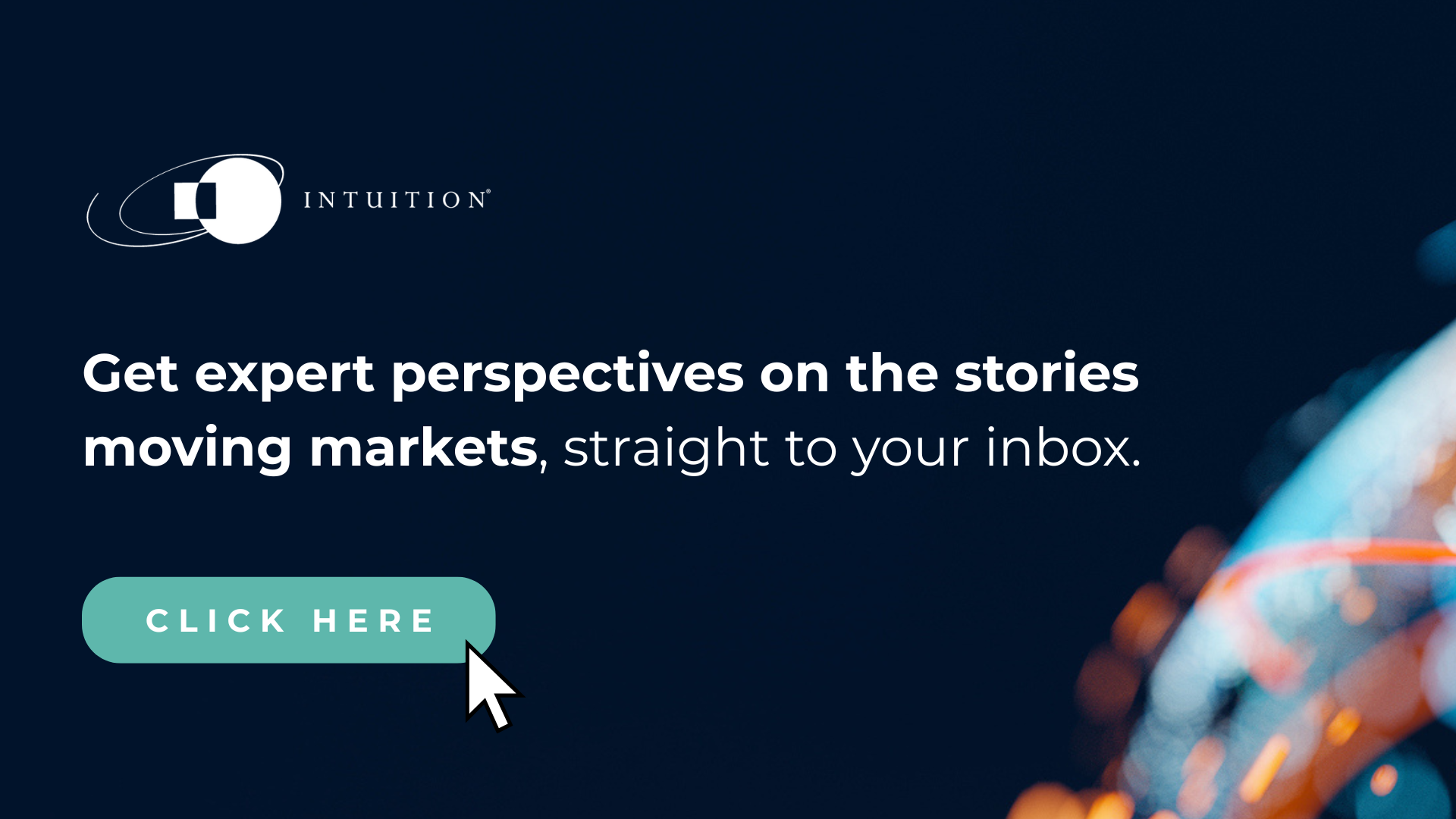Becoming a leader in finance: Learning, changing, and doing
This conversation is part of The Intuition Finance Digest, a weekly finance podcast provinding timely insights, educational pieces, and stories from voices in the industry. Learn more here: https://www.intuition.com/finance-insights-the-intuition-finance-digest/
Introduction
Ruairi: Thanks, Melissa, for joining us here on The Intuition Finance Digest. To start, could you give us an intro to who you are and where you are in your professional life?
Melissa: Absolutely. Thanks so much for having me and happy to chat with you today. I’m Melissa Watras, Director of Product at Trillium Surveyor. At Trillium Surveyor, we provide financial institutions with software to help with trade surveillance and best execution as well. I’ve been with the organization for four years now, and I’ve been in the financial industry for nearly 15 — kind of scary to say! I’ve kind of run the gambit in terms of roles. I cut my teeth in operations as a trade surveillance practitioner, then moved over to the strategy side of things, and landed at my home here at Trillium Surveyor.
From anthropology to finance
Ruairi: You’ve had a pretty interesting career trajectory, studying something completely different in college. You studied anthropology. Can you talk a bit about how you ended up transitioning into a completely different sector and the role you’re in now?
Melissa: Yeah, absolutely. It’s certainly non-traditional, I would say. So I became really interested in anthropology and decided to major in it and I was happy to do so. The kind of career opportunities, though, were certainly different from where I landed.
In my senior year, I had written a pre-dissertation on markets and how markets influence people. Luckily, at the time, I’m a Morgan Stanley alum and they were recruiting from my liberal arts college, Binghamton University, for operations people. I had a wonderful opportunity to go into operations. I was what they would call a summer analyst and it was fantastic.
There was a clear curriculum, a steep learning curve, and a lot of exposure to different financial products. I didn’t even know how to use Excel properly at the time! But I kind of fell into the space and had a few shifts since then. I went into operations, had the opportunity to move abroad, and worked as a trade surveillance analyst in the UK, then came back to the States. I’ve been lucky with the career I’ve had. And four years ago, I made the switch from working at an investment firm to working at a software company. It’s been incredibly rewarding.
Entering finance without a finance background
Ruairi: It’s interesting, you made the shift into finance. I presume when you came into that summer analyst role, you were in a cohort coming from all kinds of backgrounds?
Melissa: We were, but I think there were probably only a few liberal arts folks, the majority were coming from finance, economics, that kind of background.
It was interesting. On one hand, I had a little bit of imposter syndrome. I really wanted to prove myself and feel like I deserved to be there. But on the other hand, it does introduce diversity of thought. And I think that’s really important in organizations, especially when they’re working on incredibly complex and time-sensitive issues.
Having different voices at the table really lends itself to innovation. I think that’s served my career well too.
Bridging the knowledge gap
Ruairi: In terms of that, maybe the gap in knowledge relative to other people, how did you bridge that gap? What was your strategy around developing the skills and knowledge you needed?
Melissa: Yeah, it’s a good question. I’d say I tackled it in three ways.
First, reading. Really studying as much as possible. ChatGPT is around now, and Investopedia has been a good friend of mine. I also read a book called Trade Made Simple. Learning different stories, not just how financial institutions work, but the broader context, was really helpful.
Second, talking to anyone willing to talk to me. Whether it was a trader or someone in wealth management, understanding how people operate, what motivates them, and what their pain points are, that was really helpful in understanding how markets work and what makes people’s lives easier.
Third, human skills. Developing things like critical thinking. I think curriculums like the one you all put together at Intuition really make people differentiators. Asking: Do I have an agile mindset? Can I break down a big issue into smaller, more manageable pieces?
Those three pillars really helped me bridge the gap in knowledge that I was certainly facing at the time.

Becoming a leader in finance
Ruairi: That kind of naturally leads to the next question, which is centered around becoming a leader in the finance space and developing the skills you need. I presume some of those are the human skills you mentioned. At this phase of your career, what are you focusing on to bring yourself to the next level?
Melissa: Oh, that’s a really good question. I think the thing that’s helped me as I’ve grown into senior leadership roles has been mentorship, finding people, whether inside or outside your organization, and learning from their management styles. It’s about learning through observation, or bringing a problem to them and asking, “Is there a different way I could have tackled this?” That’s been really helpful coming up through the ranks.
The other thing I’d say is not being afraid of change.
Quite honestly, I think people sometimes get stuck in thinking, “Well, this has worked for so long, surely we don’t need to change anything.”
I remember coming into the workforce as a millennial, and gosh, millennials were seen as so foreboding. No one wanted us. All the articles were saying things like, “They don’t work hard, they don’t want to do anything,” and it was really kind of shocking sometimes.
But I don’t feel that way about the emerging generations in the workforce. I think they have really good ideas. They definitely have different motivators, and we need to be aware of that and foster it. Learning from new people, new technologies and ways of thinking, kind of keeps us current, I’d say.
The impact of AI on finance
Ruairi: We’d be remiss not to talk about AI and its impact on finance. There’s been a big shift in the past 18 months to two years. How has that impacted your work?
Melissa: Fundamentally. I joked at the start that in the early days, if you wanted to understand something, you had to go on Investopedia or comb through websites to find answers. Now, those answers are at your fingertips, of course, you still need to sense-check and make sure you’re getting the truth.
AI is showing up everywhere, anything administrative, putting together project plans, collating information, that’s changed. But also in more fundamental ways: how software works. How we leverage it to detect market manipulation. How we identify emerging patterns that haven’t even been defined yet, just looking for what’s anomalous.
It’s changed the game for the better, as long as we can implement it practically and defend it well, especially because we’re in a regulatory space. We have to be able to explain anything we’re using.
Learning AI as a leadership skill
Ruairi: Is that a learning area for you personally? Do you manage it in-house or consult others?
Melissa: It’s definitely a learning area for me. At a FINRA conference in April, I remember one of the speakers said, “People are not going to be replaced by AI. They’re going to be replaced by people who use AI.”
I think that’s true. So it’s everyone’s responsibility to learn how to interact with it and interact pragmatically. Not take everything at face value, but treat it as a tool.
It’s a learning area for me, for my organization, and I think for most of us.
Short to medium term focus
Ruairi: Since we’re talking about learning areas you’re focusing on at the moment, as a senior member of your organization and a senior leader in the space, what are your focuses over, let’s say, the short to medium-term, in terms of your own development?
Melissa: Sure. I’ll answer it two ways.
As somebody running a product in financial services, I think it’s always about keeping an eye on the horizon and thinking about emerging areas of interest in the market. I’ll give you an example: overnight trading. People were kind of mumbling about it maybe a year or two ago but now it’s a real area of focus, a real area of opportunity.
So, learning, immersing ourselves, understanding how overnight markets work — what are the opportunities? How do desks trade around the clock? What’s the accessibility of U.S. equities during thinner liquidity periods overnight?
We learned, and we built a product to service folks looking to enter that space.
Another example, we’re seeing a lot of interest in different types of behavior analysis from RIAs, for example. So we’re really looking at what’s coming and what’s interesting in the marketplace at large.
At the same time, I’m always asking: Am I running my team as effectively as possible?
What tools can help with productivity? What are the motivators that maybe I’m not thinking about?
So it’s really both sides, the product side of things and the human side of things. And again, I think you guys have a strong curriculum that fosters that kind of knowledge development.

Advice for new professionals
Ruairi: If you were a young person entering the workforce today, entering the financial space in 2025, what would you focus on? And what should someone like you, a senior member, also be focusing on?
Melissa: That’s a good one.
I think curiosity is the word I’d boil it down to. Being curious about the markets. Curious about how different parts of the organization interact. Curious about what the big picture is.
Curious about hearing a problem and going, “I have absolutely no idea what people are talking about… but let me try to learn.”
I think that’s really the differentiator nowadays. It’s not just taking things at face value. It’s questioning the status quo, digging in, and really getting your teeth into a problem, trying to be as impactful as possible. How do you make people’s lives easier? What value are you providing, to someone else or to yourself?
The role of curiosity in the workplace
Ruairi: That’s interesting. Do you think that’s something that has changed over the years? Are people becoming less curious? Or is that just a blanket thing people should focus on?
Melissa: Oh, that’s a good one too.
Are people becoming less curious? I don’t know. I’m cautiously optimistic, that’s kind of how I operate. I don’t know that people are getting less curious. I think it’s about making sure that tools are enhancing our lives, versus taking things away.
Using tools to learn, versus replace, is important.
And I think curiosity is something that people who continue to lead, and who tend to be successful, really have. Certainly in our organization, that’s how we’ve thoughtfully grown. We’ve brought in curious people.
I’ll give you an example. We recently built a brand-new product, a Best Execution tool. A bunch of people came together saying, “Okay, what’s the market doing? Can we expand this? Can we service the whole organization at large?”
Not just solving the compliance side of things, but actually trying to generate alpha for the trading side of the house. And we were able to do that successfully.
It was a bunch of curious minds sitting at the table, not shying away from hard problems, and actually being excited about them.
Shifting from banking to software
Ruairi: Somewhat on that topic of curiosity, when you moved from Morgan Stanley to Trillium Surveyor, obviously they’re two different environments, I imagine. Can you talk a bit about what that shift looked like, at a professional level?
Melissa: Yeah, absolutely. They’re certainly different, that’s for sure.
I think I’ve been fortunate throughout my whole career to work with really great people, so it lent itself to not having this culture shock. I felt supported on both sides.
I think the things like investment pressures, the things that I had to deal with at Morgan Stanley, translated nicely to the vendor/software side of things. Because I think those are critical problems: Can we try to find a solution quickly? Can we move fast? So in a way, I almost view it as… it definitely prepared me for moving to the vendor side.
And I’ve been really lucky with the folks over here at Trillium Surveyor. They’ve been incredibly patient. When I first started, maybe there were some wobbly times along the way, but I knew there were people who had my back.

DEI and mentorship work
Ruairi: I know there’s an area you’re particularly passionate about, DEI, and you’re involved in a number of different initiatives. Can you talk a little bit about that experience and the work you’re doing there?
Melissa: Yeah, absolutely.
So again, I think a theme of my career has been having really great opportunities and working with really great people. I’m passionate about kind of leveling the playing field wherever possible, giving opportunities to maybe underserved communities, folks who haven’t had exposure.
Whether that’s mentorship, or trying to leverage the successes I’ve had in my career, and even the things I haven’t been successful at, using those as learning opportunities to provide guidance for others. Particularly for students, for example, who might not have that exposure otherwise.
And I’ll go back to diversity of thought, different people from different backgrounds really lend themselves to coming up with creative, innovative solutions. Introducing that into your organization can be incredibly helpful, it certainly has been for my team.
Ruairi: Yeah, it’s interesting. There’s a sense of responsibility that comes with that, but also it seems like you believe it actually helps the business, it helps performance too.
Melissa: Absolutely. There’s the performance aspect, for sure.
What’s next for Trillium Surveyor
Ruairi: What’s next for Trillium Surveyor?
Melissa: Oh, my favorite question!
As I mentioned, we just launched our Best Execution tool, so that’s really exciting. Getting it to market, working with clients and prospects to show the impact it can have on their organization, we’re really excited about that.
I’m also personally excited about being more involved in the digital asset space, building new types of detections. Whether that’s in more established “TradFi” areas like wash trading and insider dealing, or in emerging spaces, seeing what’s happening, what’s new.
We want to be out there servicing the market. Whether it’s folks interested in participating in something new, or folks who are having challenges in existing areas, we want to keep building really impactful products that make people’s lives easier and make marketplaces safer.
Final advice for career growth
Ruairi: If you could give one message to people working in the industry today, from a senior perspective or a junior perspective, what would that message be, in general, around career development?
Melissa: Don’t stop learning.
That’s really it. Don’t stop learning.
We all have blind spots and having conversations, taking classes through Intuition, or doing a deep dive, or sitting down with somebody in a space you’ve never had exposure to… that’s what makes well-rounded people. That’s what makes well-rounded leaders and contributors.
Ruairi: That’s a good note to end on, Melissa. Thanks for the chat, and best of luck with everything at Trillium Surveyor.
Melissa: Great, thanks for having me.


